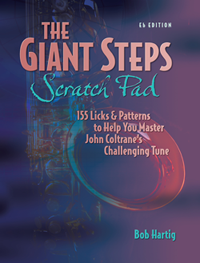Having dispensed with my rambling prelude, in part 1 of this article, to the question “What is jazz?” let’s get to the question itself.
What is jazz?
The answer used to be fairly simple, involving such concepts as syncopation, swing, improvisation, and African-American roots. The formats in which those elements played out were fairly straightforward. There was Dixieland. There was swing. There was big band. There was bebop.
But wait . . . bebop? In its day, there were those who maintained that bebop wasn’t jazz; it was cacophony, confusion, a bunch of chromatic scales played lightning fast and signifying nothing. “Let them beat their brains out till their flatted fifths are gone, then they’ll pass and be forgotten like the rest,” taunted Louis Armstrong in “The Boppenpoof Song,” but his abilities as a prophet didn’t match his brilliance as a trumpet player. Today no one would seriously contest the prodigious contribution of bop to the evolution of jazz.
Then along came Coltrane. Repeat the scenario. A lot of jazz buffs couldn’t stand him. Sheets of sound? Endless modal droning? That ain’t jazz, or so said the purists—then. Today it’s a different story; Trane has a lot of children and grandchildren. The thing called jazz broadened, embraced another icon, and forged ahead. Then came fusion, and more cries of protest. So it went, and so it has gone, and so it goes. Cool jazz, Latin jazz, free jazz, acid jazz, nu jazz, smooth jazz, punk jazz . . . from Miles to Trane to Ornette to Zorn and beyond, the list goes on, and after a while, I feel bewildered and my head hurts. Look, I just like good music, and I like improvisation, and I admire combinations of artistry and skill at a high level, and it gets to where I honestly don’t care all that much about categorizing it. This article can’t begin to cover all the complexities of a subject that so many, many writers have already addressed, and will continue to address, in far greater depth.
So in the remainder of this post, I want to share what a few others, both musicians and non-musicians, have to say about the nature of jazz. Nothing definitive, just personal, insightful, and even humorous.
Responses to the Facebook Survey
The first to respond to my question “What is jazz?” was keyboard man Bob Van Stee: “Good question. Allegedly, Louis Armstrong was asked, and his response was, ‘If you have to ask, you’ll never know.”
My good friend Ed Englerth wrote, “’Jazz is restless.’ [It can be played on] any instrument. I prefer jazz that has improvisational elements, but [it] can be written out as well.”
Camera artist Myrna Jacobs doesn’t play an instrument, and her husband, Dan, is a superb jazz trumpeter and flutist. Myrna shared in-depth:
I think a lot about jazz, and to some extent why it isn’t popular music (for the most part). But what I’ve decided is that what often passes for jazz today isn’t really jazz. It lacks life and is static, trapped in some other time, much like classical music. Creating in the moment, being true to your own emotions and being in touch with the time and place you live. A willingness to get emotional with the music is so vital. I don’t play jazz. I listen to it and, honestly, feel that much of what is played is not good.. simply copies or ideas of what it should be, rather than it just being musicians who love playing, love creating, know how to listen and being willing to put themselves out there emotionally through their notes and spaces. Great jazz can take you someplace… to another world. It’s not even about the right chords (though it plays a part and doesn’t ‘feel right’ if the player doesn’t know them in his gut). I am a huge fan of jazz music that doesn’t isolate soloists . .. but rather, all the players in the band are part of the solo in some way. They are all listening and knowing when to contribute, like a conversation. Most of all I guess that jazz at it very ultimate is a conversation…. sometimes a soloist has a lot to say, like a monologue . .. but like, in conversation, the others come in and ‘nod’, accent, repeat parts of what was said.. take off on it.. use the idea, the concept (musically). It’s not just a speech… but a conversation. I love Dixieland for the beat.. for the interplay of instruments. I love big band when it’s exciting and the power that can be generated by that many instruments is used effectively… and when it is written so that it is not just one solo after another with no relationship to each other in any way. I love a duo… of whatever instruments are used… when they are playing together.. creating together.. moving the conversation forward Sorry… I could go on and on. I have thought about this a LOT and talked about it a lot, trying to figure out why so many people do not like jazz.
Trombonist Jason Lester offered the following thoughts:
Jazz is typically defined by having extended improvisation relative to predefined melodic material: it is further distinguished from the stuff of “jam bands” and blues by harmonic content– ii V I’s, extended chords, elaborate harmonic substitution. Instrumentation is not a factor, as Bela Fleck and many other groups have demonstrated. The boundaries of jazz are (and always have been) designed to be stretched and blurred: third stream, fusion, acid, etc have allowed players to stretch and blend. This symbiosis brings new life to both jazz and to the genre it hybridizes with– some of the best Rock sax solos were dealt down by cats like Wayne Shorter and Sonny Rollins; bringing in guitarists like John McLaughlin and Mike Stern gave Miles an entirely new sound. But improvisation and harmonic content are still the signature elements.
My response to Jason:
Given the interplay of other genres with jazz, the lines get fuzzy, don’t they. Improvisation, for instance, has long been a hallmark of rock as well as jazz (though jazz came first). Yet there’s an obvious difference between the extended improvisations of David Gilmour in Pink Floyd and John Coltrane in his classic quartet; both are masterful soloists in phenomenal groups, yet there’s no question that Floyd is rock and Trane is jazz. However, there does come a point in modern music where it’s hard to say whether you’ve got fish or fowl. You’ve mentioned harmonic complexity, and that one hits the nail on the head for me. Even the supposedly static harmony of modalism in jazz involves a complex harmonic approach not just for the soloist but also, significantly, for the rhythm section, and in particular for the chording instruments (e.g., keyboard, guitar). Once you cross over beyond swing feel into rock and Latin rhythms, it may be the harmony that’s the determinant.
Jason again: “The lines really blur when you listen to Steely Dan, James Brown, Frank Zappa, or Medeski, Martin& Wood!”
Finally, Bob Van Stee alerted me to the following video clip in which Ella Fitzgerald and Mel Torme answer the question “What is jazz?” in their own inimitable way. I can’t think of a more fitting way to cap off this post.

